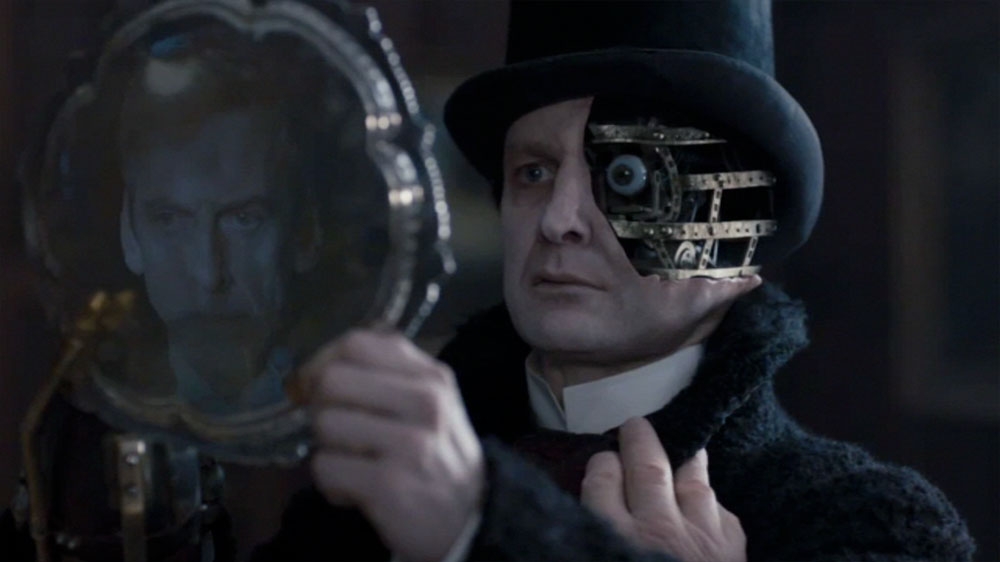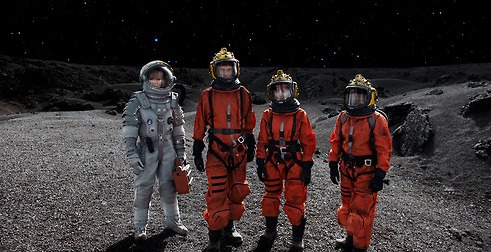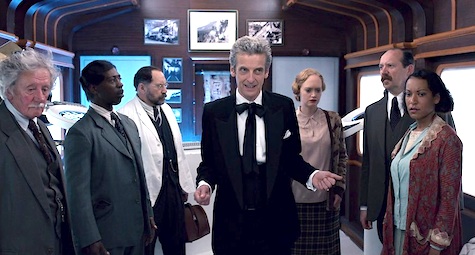If Doctor Who was like the psychic paper used by the Doctor—meaning we would only see the show we wanted to see—what would it look like? From seasons five through seven, it might have been superficially close to exactly what we thought we wanted: the adventures of a romantic, dazzling, fairy tale hero who is handsome, quirky, and a snappy-dresser. But now, the Doctor is grumpy and the stories he inhabits are more screwed up, because this season the show has gotten real by ditching fairy tales in favor of moodier science fiction.
Accusing the Matt Smith era of being a charming “fairy tale” version of Doctor Who isn’t out of nowhere. From the Doctor mentioning Amelia Pond’s name was “just like a fairy tale,” to the tinkly whimsical notes of Murray Gold’s score for the Amy scenes, to unexplained plot resolutions; the fairy tale feeling from 2010-2012-ish quickly became a catch-all justification for the whole shebang, at least with Steven Moffat (back then a new showrunner) at the reigns. Amy gets her baby stolen in some sort of Rumpelstiltskin deal, the Doctor becomes a legend to people who live in a Forest, and the entire universe can stop/be changed because of a magical kiss between a Time Lord and River Song.
Back in a May 2010 interview with io9, Moffat rationalized the fairy tale aspects of Matt Smith’s Eleventh Doctor by outright admitting this writing tendency was a sort of whim for making certain kinds of stories work:
“That’s just how you justify it. It’s a mechanism by which you justify what happens. There was magic in fairy tales back when people believed in magic. There isn’t magic in Doctor Who — there are sometimes [laughs] token scientific explanations for everything…”
But, after three seasons of saying the show was just a fairy tale, Moffat has changed his tune (and Murray Gold, his tunes, too) and has said publicly that the fairy tale era is “over,” and that there are more “consequences,” in the current direction of Doctor Who. As big time fans know, we can’t always take Moffat at his word, but a glance through season 8, up to this point, reveals he wasn’t kidding. Currently, this show is far more interested in telling thought-provoking science fiction stories, than dazzling (or frightening) us with an outer-space fairy tale.
This isn’t to say the science itself is necessarily more realistic or more accurate at all, because it’s not, it’s just that the style of the writing has done away with over-the-top character-stuff in favor of letting us think about each particular “what if?” a little bit longer. A lot of bloggers and critics have pointed out the nifty triumph of this season is in presenting a more serious character arc with Clara and also messing with the morality of the Doctor himself by asking if he really is a good person or not. (Which to be fair, people worried about during the Matt Smith era, too, and the David Tennant era, and…)
Charlie Jane Anders’ recent assertion that a major character arc has displaced a season-long mystery is a totally accurate observation, but I’d argue this shift is particularly made possible by having the stories just feel a little more science fiction-y and less fairy tale.

I’ll spell it out: the individual episodes themselves this season aren’t designed to be instant crowd-pleasers, or even all that fun. Right from the start, in “Deep Breath,” we are presented with the question of how far robots would go to become human if their programming was out of whack. These robots are a direct sequel to Moffat’s very own beloved second season classic “The Girl in the Fireplace,” but this time out, the robots are ugly, aimless, and beaten down by time. The robots in each episode reflect the tone that the show is trying to convey. In “The Girl in the Fireplace,” Tennant’s Doctor called these robots “lovely” and everyone swooned when he rode that horse. What a romp! In “Deep Breath,” those same clockwork robots are treated like sad, damaged, real things.
Robots without a real understanding of their own “humanity” is a classic science fiction concept, showing up very obviously in Isaac Asimov’s books, but probably more relevantly in Philip K. Dick’s Do Androids Dream of Electric Sheep? The notion that these robots are looking for “the promised land” also gives these versions of the clockwork robots a borrowed human religion, another cool science fiction concept which cropped up most recently on the contemporary Battlestar Galactica. These clockwork robots weren’t as hardcore as the Cylons from BSG or the replicants from Blade Runner, but they certainly evoked that mood instead of only being a funny/scary collection of gears.
Similarly, the Boneless in “Flatline,” are baddies specifically derived from a science fiction idea: the notion of a two-dimensional creatures. True, the “point” of the episode may have been a morality play about Clara taking on the powers of the Doctor, but it was facilitated by an awesome head-scratching sci-fi notion; what if there were two-dimensional creatures? How would that play out?
When 2D was revealed to be the nature of the conflict, I was super pumped because all I could think of was Madeline L’Engle’s A Wrinkle in Time, and the brief journey Meg and everyone have to the two-dimensional world in that novel. Depictions of beings in a two-dimensional universe stretch all the way back to the 19th century (see the social commentary tract Flatland: A Romance of Many Dimensions) but the concept of awareness and effect across spatial dimensions is a real consideration in theoretical physics, as demonstrated in this great Carl Sagan segment from Cosmos about how hard it would be for a two-dimensional creature to understand a three-dimensional world. Check it out:
Further, the tiny TARDIS in “Flatline” isn’t an Alice in Wonderland thing at all, but actually more of a direct reference to the Third Doctor sci-fi heavy story “Carnival of Monsters.” During that era, Jon Pertwee’s Doctor was a “science advisor” to UNIT, and the tone of the show followed suit, featuring more science fiction conundrums of the week. We all have a fairly clear idea that Capaldi’s costume and Pertwee’s costumes are super-similar, but that’s not the only telling and interesting aesthetic that’s returned. It’s all about space suits.
Space suits are back in a big way in Doctor Who this year, and not in the faux-ridiculous way they were presented in “The Impossible Astronaut.” Whether it’s the end of the universe in “Listen” or the our very own moon in “Kill the Moon”—living in space is considered scary this season. It’s so scary in fact, you’ve got to wear a space suit and breathe heavily into it! Like in Alien!
In fact, “Kill the Moon” specifically addresses humanity’s fears about heading into space in ways that seem grim and challenging simultaneously. This too, is a classic science fiction theme. In the novel version of Logan’s Run, human beings haven’t actually figured out how to journey into space at all, partially due to lack of ambition. In nearly all of Star Trek, the notion of getting out into space is what unites humanity and saves us from being jerks to each other. “Kill the Moon” echoes that hopeful note, and that’s because Doctor Who hasn’t gone full Battlestar Galactica or even Twilight Zone here. Plus, who doesn’t love a giant space egg?

And the old-school science fiction references keep coming! “Into the Dalek” made a very obvious reference to Asimov’s novel Fantastic Voyage (which was actually a novelization) while the trope of “going on a Fantastic Voyage” crops up in everything from the Deep Space Nine episode “One Little Ship” to the cult 1987 movie Innerspace. (Which also starred Robert Picardo, who you know played “the Doctor” on Star Trek: Voyager.)
Philip K. Dick shows up again in the episode “Time Heist” which is an obvious homage to the short story “Paycheck,” in which a man has no memory of having done a job, and then is “paid” with a bag of mysterious objects. Memory erasure combined with time travel is also connected to Kurt Vonnegut’s The Sirens of Titan, where certain characters don’t even remember who they are even when they meet old friends in different contexts. Vonnegut references are also abound in “Listen” where time travel allows you to visit yourself much like Billy Pilgrim sort of does in Slaughter-House Five. But really, the sweet, comforting use of the word “listen” itself might be the biggest Vonnegut reference of all.
“Mummy on the Orient Express” demonstrated Doctor Who’s capacity for presenting wacky science fiction concepts which you’re forced to take seriously. Everything makes sense in this episode, even if the premise is totally absurd, which accounts for just about every single thing Doulgas Adams ever wrote, including The Hitchikers Guide to the Galaxy. Adams, of course, also wrote for the Tom Baker era of Doctor Who! It’s not that “Mummy on the Orient Express” is a straight out Douglas Adams homage, it’s just that it feels like something he probably would have liked. Science fiction, plus goofy history, plus classic horror! You could argue we haven’t seen combos quite like this since the Tom Baker era.
Last week’s “In the Forest of Night,” brought this no-more-fairy-tale thing all the way home. The Doctor briefly calls Clara “Little Red Riding Hood” and the little girl Maebh runs around in a red hoodie, but as opposed to being a fairy tale approach to a science fiction concept, it’s a science fiction story that “explains” the existence of fairy tales; specifically western culture’s obessions with forests. (Right here on Tor.com, Chris Lough is correct to point out that “the Eleventh Doctor would undoubtedly feel right at home in this Trafalgar Squarian forest, but the Twelfth Doctor refuses to submit to that kind of story.”) Referencing the Tunguska meteor strike is a sure-fire sign of sci-fi geeking out. This real-life event has been referenced or explored in science fiction in everything from Ghostbusters, to Arthur C. Clarke’s Rendezvous with Rama, and even in two different old-school Doctor Who novels.
In 2013, with everything leading up to the show’s 50th anniversary hoopla, Doctor Who seemed more caught-up with its own mythological importance than, really, anything else. Matt Smith’s Doctor worried out loud in season’s 6 and 7 that he’d become too big, and attempted to erase all of his fairy tale action from history. Now, with the new Capaldi season, it seems that has actually worked, because lately, the Doctor has literally let the cool science fiction story happen without even being in the action all that much.
To be clear: the often-used fairy tale structure of Doctor Who and big over-the-top heroics of both David Tennant and Matt Smith are wonderful and totally essential to the popularity of the contemporary show. Saying Capaldi is somehow “real” Doctor Who because it’s more of a science fiction show would be crazy. I’m trying to make a point about ratio here, and whereas the Matt Smith era favored a heavier dose of fairy tale to sci-fi, the new formula has inverted that. The fairy tale part is still there (“Robots of Sherwood” and “In the Forest of the Night,” duh) it’s just not the main focus anymore.
As a strange side effect, I think these new episodes are slightly less entertaining to a casual viewer than some in a previous seasons, but I do think they are by-and-large smarter. To put it another way: “The Girl in the Fireplace,” is still a better episode of television than “Deep Breath,” even if “Deep Breath” is more honest and intellectual.
If the fairy tale of the Matt Smith era is over, and the science fiction-centric Capaldi era is here, does Doctor Who have more narrative integrity now? Maybe. It may not be better or worse, but it is a nice change, insofar as variety in any TV show is totally essential. Colin Baker’s Sixth Doctor infamously (and creepily) told Peri that “change” had come and “not a moment too soon.” That version of the Doctor didn’t have psychic paper, and yet, the contemporary show somehow sensed it needed to change by moving away from the fairy tale structure.
Now, we’ve got a lonely alien who is a little depressed from having to save the world for so long? That doesn’t sound like a fairy tale. That sounds like science fiction.
Ryan Britt is an essayist and critic. His writing about science fiction and fantasy appears regularly here and in numerous other publications. He is the author of an essay collection forthcoming from Plume Books in Fall of 2015.










